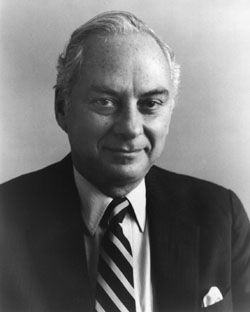Arthur Hartman
( diplomat) | |
|---|---|
 | |
| Born | Arthur Adair Hartman 1926-03-12 |
| Died | 2015-03-16 (Age 89) Washington D.C. |
| Nationality | US |
| Alma mater | Harvard University |
| Member of | Brookings Institution, Future of Russia Foundation |
| Interests | Marshall Plan |
Arthur Adair Hartman (March 12, 1926 – March 16, 2015) was an American career diplomat who was Ambassador to France under Jimmy Carter and Ambassador to the Soviet Union under Ronald Reagan.
Hartman was a panelist on the session about The Soviet Union Under Gorbachev: Foreign Policy Implications at the 1986 Bilderberg.
Education
Hartman served in the United States Army Air Corps from 1944 to 1946. He graduated from Harvard University in 1947 and attended Harvard Law School from 1947 to 1948.[1]
Career
Rather than pursuing a degree, he took a job in the Marshall Plan administration in Europe, followed by work in the Foreign Service. Among his many postings with the State Department over the years were positions in Paris, Saigon, London and in Brussels as deputy chief of the U.S. Mission to the European Union.
In 1974, Hartman was appointed Assistant Secretary of State for European and Canadian Affairs. From 1977 until 1981 he was the Ambassador to France[2] and from 1981 until 1987 Ambassador to the Soviet Union.[3]
Hartman was a member of the Council on Foreign Relations, the American Academy of Diplomacy, the French American Foundation and was on the Advisory Council of the Brookings Institution. He was awarded the French Légion d'honneur.
In 2004, he was one of the 26 founders of Diplomats and Military Commanders for Change. Hartman died on March 16, 2015, in Washington, D.C., four days after his 89th birthday.[4]
Events Participated in
| Event | Start | End | Location(s) | Description |
|---|---|---|---|---|
| Bilderberg/1975 | 25 April 1975 | 27 April 1975 | Turkey Golden Dolphin Hotel Cesme | The 24th Bilderberg Meeting, 98 guests |
| Bilderberg/1979 | 27 April 1979 | 29 April 1979 | Austria Baden Clubhotel Schloss Weikersdorf | 27th Bilderberg, 95 guests, Austria |
| Bilderberg/1983 | 13 May 1983 | 15 May 1983 | Canada Quebec Château Montebello | The 31st Bilderberg, held in Canada |
| Bilderberg/1986 | 25 April 1986 | 27 April 1986 | Scotland Gleneagles Hotel | The 34th Bilderberg, 109 participants |
References
- ↑ https://www.nytimes.com/1981/08/22/world/man-in-the-news-from-opera-to-bolshoi-arthur-a-hartman.html
- ↑ https://www.nytimes.com/1981/08/18/nyregion/c-corrections-237409.html?scp=22&sq=Arthur+A.+Hartman&st=nyt
- ↑ https://www.nytimes.com/1987/03/31/world/departing-us-envoy-criticizes-use-of-young-marine-guards-in-moscow.html?scp=8&sq=Arthur%20A.%20Hartman&st=cse
- ↑ 'Arthur A. Hartman, U.S. ambassador to Soviet Union, Dies at 89,' New York Times, Sam Roberts, March 18, 2015